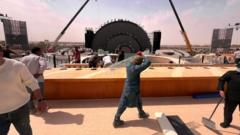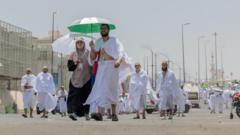As preparations intensify for the 2034 World Cup, reports from Human Rights Watch and FairSquare highlight a disturbing increase in migrant worker deaths in Saudi Arabia, with inadequate safety measures and opaque reporting practices shielding the grim reality from public scrutiny.
Human Rights Groups Alarmed by Rising Deaths of Migrant Workers in Saudi Arabia Ahead of 2034 World Cup

Human Rights Groups Alarmed by Rising Deaths of Migrant Workers in Saudi Arabia Ahead of 2034 World Cup
With Saudi Arabia set to host the World Cup in 2034, human rights organizations express deep concerns over the escalating fatalities among migrant construction workers.
Human rights advocates are sounding the alarm over a troubling spike in migrant worker fatalities in Saudi Arabia as the nation gears up to host the 2034 World Cup. Human Rights Watch and FairSquare both released reports emphasizing the alarming trend of deaths among construction laborers, a grim situation exacerbated by the country’s ambitious infrastructure projects for the tournament.
The organizations indicate that many worker deaths are misclassified as natural causes, leading to bereaved families receiving no compensation for their losses. Minky Worden, director of Global Initiatives at Human Rights Watch, cautioned that the upcoming event, the largest and priciest World Cup to date, could come with a catastrophic human toll, particularly as millions of migrant workers undertake the construction of new stadiums, a transit network, and thousands of hotel rooms.
The warnings followed a high-profile visit by FIFA President Gianni Infantino and former President Donald Trump to Saudi Arabia for an investment forum. FIFA claims a commitment to upholding human rights but has faced criticism from advocates alleging it has failed to learn from the migrant worker tragedies experienced in Qatar's World Cup preparations in 2022.
Due to restrictive access for human rights organizations and the prohibition of labor unions, accurate data on migrant worker fatalities proves elusive. However, interviews conducted by Human Rights Watch revealed tragic accounts from the families of 31 migrant workers from Bangladesh, India, and Nepal, who suffered fatal accidents on job sites, including falls and equipment-related fatalities. Additionally, extreme heat remains a significant concern as construction efforts ramp up throughout the sweltering summer months.
Despite the Saudi government's assertions of progress in occupational health and safety, advocates remain skeptical of these claims. The global construction worker union BWI reported an increasing trend in preventable accidents, attributing them to ongoing systemic issues within labor oversight practices.
James Lynch, co-director at FairSquare, painted a bleak picture of the current realities faced by migrant workers—an unjust system prioritizing profit over safety, leaving countless families without support and clarity regarding the deaths of their loved ones. He described FIFA’s human rights policies as inadequate, emphasizing the stark contrast between the luxury of high-profile events and the harsh lives of workers supporting them.
In response, FIFA has pledged to develop a workers' welfare system aimed at establishing and enforcing minimum standards for worker rights in line with construction for the World Cup. Yet, details remain scant, raising further questions about the will and capacity to ensure worker protections.
As the catastrophic implications of these working conditions come to light, both Human Rights Watch and FairSquare are urging Saudi authorities, FIFA, and employers to launch thorough investigations into migrant worker deaths and ensure that families affected receive dignified and timely compensation. The call for immediate reforms remains crucial as the clock ticks down to the World Cup and the inevitable expansion of labor demands in a system already fraught with peril.
The organizations indicate that many worker deaths are misclassified as natural causes, leading to bereaved families receiving no compensation for their losses. Minky Worden, director of Global Initiatives at Human Rights Watch, cautioned that the upcoming event, the largest and priciest World Cup to date, could come with a catastrophic human toll, particularly as millions of migrant workers undertake the construction of new stadiums, a transit network, and thousands of hotel rooms.
The warnings followed a high-profile visit by FIFA President Gianni Infantino and former President Donald Trump to Saudi Arabia for an investment forum. FIFA claims a commitment to upholding human rights but has faced criticism from advocates alleging it has failed to learn from the migrant worker tragedies experienced in Qatar's World Cup preparations in 2022.
Due to restrictive access for human rights organizations and the prohibition of labor unions, accurate data on migrant worker fatalities proves elusive. However, interviews conducted by Human Rights Watch revealed tragic accounts from the families of 31 migrant workers from Bangladesh, India, and Nepal, who suffered fatal accidents on job sites, including falls and equipment-related fatalities. Additionally, extreme heat remains a significant concern as construction efforts ramp up throughout the sweltering summer months.
Despite the Saudi government's assertions of progress in occupational health and safety, advocates remain skeptical of these claims. The global construction worker union BWI reported an increasing trend in preventable accidents, attributing them to ongoing systemic issues within labor oversight practices.
James Lynch, co-director at FairSquare, painted a bleak picture of the current realities faced by migrant workers—an unjust system prioritizing profit over safety, leaving countless families without support and clarity regarding the deaths of their loved ones. He described FIFA’s human rights policies as inadequate, emphasizing the stark contrast between the luxury of high-profile events and the harsh lives of workers supporting them.
In response, FIFA has pledged to develop a workers' welfare system aimed at establishing and enforcing minimum standards for worker rights in line with construction for the World Cup. Yet, details remain scant, raising further questions about the will and capacity to ensure worker protections.
As the catastrophic implications of these working conditions come to light, both Human Rights Watch and FairSquare are urging Saudi authorities, FIFA, and employers to launch thorough investigations into migrant worker deaths and ensure that families affected receive dignified and timely compensation. The call for immediate reforms remains crucial as the clock ticks down to the World Cup and the inevitable expansion of labor demands in a system already fraught with peril.




















